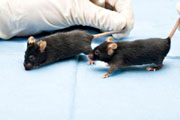VOA标准英语2012--Scientists Identify Deafness Gene in Mice
搜索关注在线英语听力室公众号:tingroom,领取免费英语资料大礼包。
(单词翻译)
Scientists Identify Deafness Gene1 in Mice
Scientists have identified a gene that causes deafness in mice, and they say it could lead to a better understanding of hereditary2 deafness in humans and maybe new treatments in the future.
Scientists had previously3 focused on a group of genes4 that were associated with inherited deafness, but now researchers at Washington University in Saint Louis have implicated5 a specific gene.
"So, when we inactivated6 the FGF20 gene in mice, we find that the resulting mice had no ability to hear, although they were otherwise very healthy, they were fertile, and they lived a normal lifespan," says senior researcher David Ornitz, adding work by other scientists pointed7 them to that particular gene.
When examined, the mice had visible changes in their inner ear. Outer hair cells - critical to hearing - normally run in a densely8 packed row, but in these mice the hair cells were patchy, and there were fewer of them.
"So we found there is patchy formation of sensory9 cells," says post-doctoral fellow Sung-Ho Huh. "And we also found, within the sensory cells, we found the number of specific outer hair cells had decreased, but the inner hair cells are intact."
 |
| Researchers at Washington University in Saint Louis have identified a specific gene that causes deafness in mice. |
Hereditary deafness is relatively10 rare. Much more common is hearing loss that comes with age or exposure to noise. Right now, about the only treatment is hearing aids. But Ornitz says a better understanding of how the FGF20 gene is linked to the body's system for capturing sound could lead to new therapies.
"Eventually, it might be possible to use a gene therapy approach or some other drug-type approach, in which you could actually correct a deficit11 due to loss or inactivation12 of FGF20. But that will require quite a bit more research."
 收听单词发音
收听单词发音 




